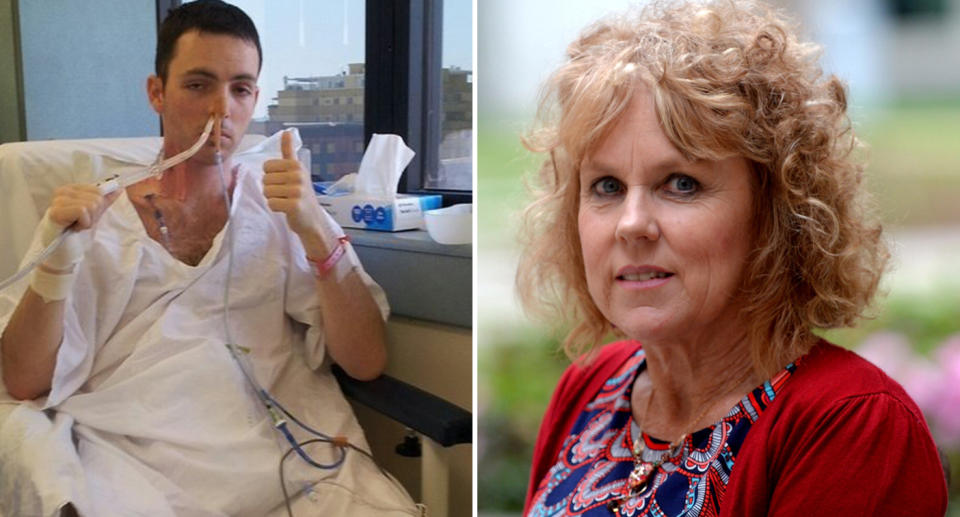Why Australians are still being forced to the black market for medicinal cannabis
Ever since Lucy Haslam’s 25-year-old son Dan died from bowel cancer in 2015, she has been at the forefront of a fight to help patients who face the same painful and desperate situation that her son endured in his final days.
Dan Haslam of Tamworth in northern NSW used medicinal cannabis as a way to manage the effects of his cancer and corresponding treatment, in the process becoming an advocate for the controversial medicine.
Dan used illicit marijuana for pain relief, which allowed him to reduce the amount of opioids he had to take.
“The first reason he tried it was to try and stop vomiting from chemotherapy,” Ms Haslam told Yahoo News Australia.
“When he started taking more we noticed his mouth ulcers, they all cleared up.”

Despite the reported success of numerous patients like Dan, access to legally sanctioned medicinal cannabis remains difficult for most patients.
Medicinal cannabis products remain unapproved by the Therapeutic Good Administration (TGA) and can only be acquired through the Special Access Scheme.
It ostensibly means all approved options have to be exhausted before doctors can even apply for access for an unapproved cannabis product. And the doctors who are willing to prescribe such products aren’t able to advertise the fact.
Because medical cannabis products aren’t technically approved, they can’t be subsided by the Pharmaceutical Benefits Scheme.
With all the hurdles and obstacles in the way – as well as the often exorbitant costs involved – the end result is that it’s much easier for sick patients to turn to the black market.
“It’s not really fit for purpose, the way they’ve chosen to administer cannabis through the TBA as if it was a similar pharmaceutical drug ... It just hasn’t really worked,” Ms Haslam said.
“The issues most patients are having now are affordability-related ... It’s far cheaper to access the black market but you’re potentially putting yourself at risk.”
Due to the diverse response exhibited by patients who use medicinal cannabis, she wants to see it made more accessible for those who demonstrate a better quality of life by using the drug, and want to avoid more addictive opium-based pain relief medicines.
She was among a group – backed by the Greens – who travelled to Canberra this week calling on the government to improve regulations around medicinal cannabis.
Privately, Ms Haslam holds misgivings about bureaucrats’ desire to improve the system for those looking to access medical cannabis.
“I was told by the fellow who wrote the regulation that they’re not going to do anything to jeopardise the opium industry,” Ms Haslam told Yahoo News recently.

‘Government paying for my weed while I’m in jail’
Army veteran Lee James Donnollan could go to prison for illegally growing the medicine he said he'll be allowed to use if he's behind bars.
The Townsville resident was also in Canberra to ask politicians to waive his charges after Queensland police caught him growing cannabis.
Advocates and Greens leader Richard Di Natale called for the government to grant an amnesty for those charged for obtaining medicinal cannabis and to set up a new process to access the drug.
Medically discharged in 2013 after eight years of service, including eight months in Afghanistan, Mr Donnollan uses medicinal cannabis to treat symptoms of his post traumatic stress disorder.
At the time, he was so emotionally fragile, he cried at kid's cartoons.
"I just couldn't deal anymore and then I just started getting worse," Mr Donnollan told AAP.
Not wanting to take multiple medications, he started using medicinal cannabis after he was discharged but was caught growing it in 2016.
Placed on a good behaviour bond just as using it became legal federally, Mr Donnollan went through an 18 month approval process to use the drug.

When he finally got the green light, he was told medicinal cannabis oil treatment would cost him over $1000 a month. Unable to afford it, he returned to cultivating it before he was caught and charged again in March this year.
"They took my medicine and told me I should be in jail for it," Mr Donnollan said.
Since then, Mr Donnollan has been told he can now claim it on his veteran's benefits.
"It would then be a situation where the government would be paying for my weed while I'm in jail for weed," Mr Donnollan said.
Medical establishment not convinced
Despite growing calls by advocates for easier access to medical cannabis, Australia’s mainstream medical establishment remains reluctant to lend support.
In a four-year study of 15,000 patients suffering chronic pain, it was found that such cannabis use does not improve their health, the Australian Medical Association stated in a blog post in July 2018.
“It doesn't give us the surety about how, when, and why to use it with complete comfort,” AMA president Tony Bartone said.
“Where it's probably got its best level of indication and evidence supporting it, there is still conjecture about the right form and the right type to be using.
“But in other things like palliative care, some of the studies show a really poor level of evidence.”
With AAP
Do you have a story tip? Email: newsroomau@yahoonews.com.
You can also follow us on Facebook and Twitter, download the Yahoo News app from the App Store or Google Play and stay up to date with the latest news with Yahoo’s daily newsletter. Sign up here.



